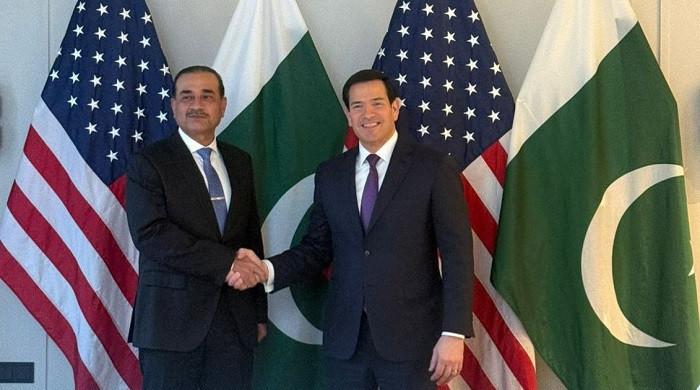What do the crashing oil prices mean for Pakistan?
Report says drop in oil prices would be a positive for macro-economic indicators as Pakistan’s imports are oil price-driven
March 09, 2020

Global oil prices witnessed a significant drop on Monday, sending markets around the world in a frenzy.
According to reports, oil fell by almost 30%, the most since 1991, after Saudi Arabia started a price war with Russia by slashing selling prices and pledging to unleash its pent-up supply onto a market already reeling from falling demand because of the coronavirus outbreak.
However, it would be interesting to see the impact of this sudden decline in prices on the Pakistani economy.
According to an analysis shared by Topline Securities, the global drop in oil prices will likely benefit Pakistan's macro-economic indicators even though oil companies will take a hit due to the drop.
“We believe lower oil prices are a net positive for Pakistan’s macros (especially the external account), as 26% of Pakistan’s imports are oil price-driven,” said the firm in a report published on Monday. It added that if oil prices drop to $20 per barrel, Pakistan’s oil import bill would decrease by $ 38-4.2 billion.
The firm is also forecasting that exports and remittances could see a cumulative reduction by around $1-2 billion.
“Hence, on a net basis, Pakistan’s external account could potentially improve by US$2.2-2.8 billion (50% of the current account deficit) due to $20 per barrel lower oil prices,” said the report. It also expected the greenback to remain stable against the Rupee in the near future.
Also read: Pakistan stocks make slow recovery after 2,200 points wiped off KSE-100 index
The securities firm also said that lower oil prices will also help give the ruling Pakistan Tehreek-e-Insaf government enough fiscal space “to sail through at least the next couple of IMF reviews”.
However, the report noted that it was unlikely that the government would pass on the impact of lower oil prices to the consumers. It added that decreased oil prices will also help the government pocket part of lower oil prices in electricity tariffs which would decrease the circular debt.
The securities firm also projected that gas prices will also subside.
The lower oil prices will also lead to a natural decrease in inflation, it said. “We estimate, average annual inflation could potential come down by 1-1.5% due to $20 per barrel lower oil prices,” said the report.
The securities firm also believes that oil prices will affect the State Bank of Pakistan’s upcoming Monetary Policy which is due this month, and may motivate a slash in the policy rate.
“We expect Pakistan Investment Bonds (PIBs) and Treasury Bill yields to follow suit.”
Sector by sector analysis
The firm has said the Oil and Gas Exploration and Production sector would be hit negatively by the decrease in the prices, with Pakistan Oilfields Limited, PPL, OGDC and MARI bearing the brunt of the price reduction.
Oil marketing companies (OMCs) and refineries will also bear a negative impact. The firm said OMCs will witness lower prices as furnace oil and RLNG margins are fixed as a percentage of oil prices. On the other hand, banks will also bear a negative impact due to the crisis.
Topline also predicted that lower oil prices would have a positive impact on the cement, auto and steel and glass industries.
Also read: Coronavirus fears and drop in oil prices trigger collapse of Asian markets
According to the report, the cement sector will benefit as raw material (coal and clinker) costs make up around 40% of the overall cost, noting that coal prices have also started to decline with the oil price slash.
It added that the auto sector would benefit as a decline in interest rates and potentially better disposable income could help people buy more vehicles.
Chemicals, independent power producers, textile and fertilizer sectors are unlikely to be impacted by the decline in prices.
Drop in oil prices
Oil fell by almost 30% on Monday, the most since 1991, after Saudi Arabia started a price war with Russia by slashing its selling prices and pledging to unleash its pent-up supply onto a market reeling from falling demand because of the coronavirus outbreak.
Brent crude futures fell by as much as $14.25, or 31.5%, to $31.02 a barrel. That was the biggest percentage drop since January 17, 1991, at the start of the first Gulf War, and the lowest since Feburary 12, 2016.
Brent crude was trading at $35.75 per barrel at 0114 GMT.
Saudi Arabia, the world’s biggest oil exporter, is attempting to punish Russia, the world’s second-largest producer, for balking on Friday at production cuts proposed by the Organisation of the Petroleum Exporting Countries.











